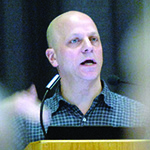Michael Brauer, a professor in UBC’s School of Population and Public Health, on the link between air pollution, genes and asthma.
Can traffic pollution lead to childhood asthma?
Yes, living in areas with high levels of traffic-specific pollution does appear to cause the development of asthma in children. In addition, air pollution in general can act to worsen asthma in those people who already have this disease.
Do genetics play a role?

Prof. Michael Brauer
As part of our recent Traffic, Asthma and Genes (TAG) study, funded by AllerGen, my team and I looked at data from 15,000 children in Canada and Europe, cataloguing the distance of their residences from busy roads, exposure to traffic-related air pollution (TrAP), presence of other asthma and allergy risk factors and ten targeted genetic variants. We found that children with specific genetic profiles had a significantly greater risk of developing asthma in high TrAP environments. Most dramatically, TrAP-exposed children with one variant of the GSTP1 gene had double the expected risk.
What does this mean in terms of a public health strategy?
It tells us that person’s genes and living conditions work in tandem to increase the risk of asthma. To get a clear grasp of the impact pollution might have on respiratory health and subsequently to create suitable prevention strategies, we need to take into account the genetic vulnerabilities within the population.
We also know that when people move away from high-traffic areas, their risk of heart disease decreases, and new evidence is showing that the same may very well be true for asthma.
Prof. Michael Brauer is an expert on the health impacts of traffic-related air pollution. Read his latest study, published January 27 in Environmental Health Perspectives journal.